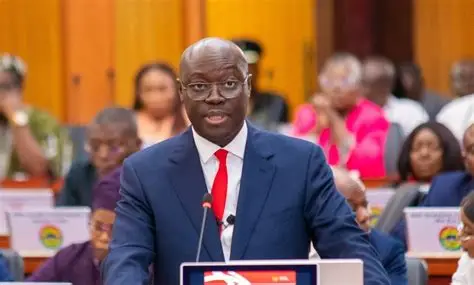As global oil prices continue their downward trend, there was hope that consumers in Ghana would experience a corresponding reduction in fuel costs, providing much-needed relief to households and businesses across the country.
Brent crude, a primary global benchmark for oil prices, has seen a notable decline in recent weeks, reflecting a broader decrease in the prices of refined petroleum products.
However, despite these promising shifts in the international market, the depreciation of the Ghanaian Cedi against the U.S. Dollar is threatening to Hamper these benefits, causing fuel prices in Ghana to remain volatile.
Although the cost of refined petroleum products has declined internationally, the weakening Cedi-to-Dollar exchange rate has counteracted these benefits.
The continued devaluation of the Cedi means that the cost of importing petroleum products remains high, keeping fuel prices from significantly decreasing in the local market.
To mitigate exchange rate pressures, thirteen Bulk Oil Distribution Companies (BDCs) secured $20 million from the Bank of Ghana (BoG) through its latest foreign exchange forward auction held on February 12, 2025.
This forex intervention is part of BoG’s broader strategy to ensure foreign exchange availability for the downstream petroleum sector.
The forex forward auction is a mechanism designed to enhance liquidity in the oil distribution industry, helping to stabilize fuel prices amid the collapse of the Gold-for-Oil initiative.
As part of its liquidity-enhancing measures, the BoG has allocated a total of $120 million to BDCs in the first quarter of 2025, releasing $20 million every two weeks to support the energy sector.
By injecting forex liquidity, the BoG aims to ease exchange rate pressures, ensuring that BDCs can import petroleum products without excessive cost fluctuations.
Market analysts suggest that continued forex support for the downstream petroleum sector will help cushion consumers from sharp fuel price hikes while also maintaining operational stability for oil distribution companies.
Gold-for-Oil Scheme Under Scrutiny

Despite these efforts, the Bank of Ghana’s involvement in the Gold-for-Oil scheme has faced increasing scrutiny.
The scheme, which was introduced as a way to reduce Ghana’s reliance on foreign exchange reserves and stabilize fuel prices, has come under criticism for its long-term viability and governance issues.
According to Bright Simons, the Vice President of the policy think tank IMANI Ghana and founder of mPedigree, the Bank of Ghana has assumed significant market risk under the scheme.
“Unlike private-sector players who hedge against volatility, the central bank is fully exposed to mispricing and adverse market movements.”
Bright Simons, the Vice President of the policy think tank IMANI Ghana and founder of mPedigree
Reports indicate that the BoG has acquired gold worth $9 billion under the scheme, equivalent to approximately GHS 130 billion at prevailing exchange rates. However, concerns about transparency have emerged, with critics questioning the actual flow of funds within the initiative.
Simons further highlighted discrepancies in the financial statements of the Precious Minerals Marketing Corporation (PMMC), which is responsible for sourcing gold from small-scale miners.
“PMMC’s reported annual revenue has remained stagnant at around $3 million over the past four years.
“This raises serious questions about the actual flow of funds and whether alternative channels are being used.”
Bright Simons, the Vice President of the policy think tank IMANI Ghana and founder of mPedigree
The lack of transparency in the Gold-for-Oil transactions has fueled concerns about whether the initiative has delivered its intended benefits or contributed to market distortions and foreign exchange misallocations.
In light of these issues, the new administration in Ghana has indicated its intention to dismantle the Gold-for-Oil program and replace it with a new initiative—the Ghana Gold Board (GoldBod).
GoldBod will act as the sole buyer of gold from legal small-scale miners, serving as the sole assayer, seller, and exporter of gold in the country.
The initiative is expected to streamline the gold export process, reduce gold smuggling, and improve foreign exchange accumulation, which could, in turn, help stabilize the Cedi.
While the drop in global fuel prices presents a potential for relief to consumers in Ghana, the ongoing depreciation of the Cedi is threatening to negate these benefits.
Despite interventions by the Bank of Ghana through foreign exchange forward auctions, fuel prices in the country remain volatile due to the complex interplay of global oil price trends and local currency challenges.
The Gold-for-Oil program, although initially promising, has raised concerns about its transparency and long-term sustainability.
As Ghana navigates these challenges, the effectiveness of BoG’s forex auctions, the replacement of Gold-for-Oil with GoldBod, and broader economic policies will be critical in determining whether consumers will experience long-term relief from fuel price volatility.
READ ALSO: UK Ready to Send Troops to Ukraine























